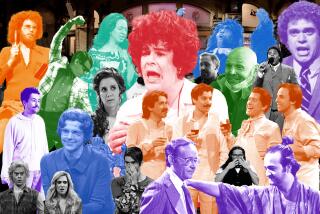Media Giants at Odds Over FCC Cap on TV Station Ownership
When the dust finally settles around one of the more heated media brawls in recent memory here, one thing is certain: Big Television will come out ahead.
That’s because it’s on both sides of the fight.
In a hotly contested lobbying battle, the major TV networks are squaring off against some of the country’s biggest station groups, including many of their own affiliates.
At issue is a Federal Communications Commission rule that prevents a single company from owning TV stations that reach more than 35% of households nationwide -- one of several FCC media-ownership regulations under review. These restrictions were set to be discussed today at a USC forum. But the session was postponed because the blizzard on the East Coast prevented FCC officials from traveling to Los Angeles.
When giant fights giant, the public interest may be difficult to discern. But corporate interests are clear.
Viacom Inc., which owns CBS, and News Corp., which owns Fox, are pushing for change, after convincing a federal court last year that the 35% limit is arbitrary. Not coincidently, recent acquisitions have put both companies over the cap, with each reaching about 40% of the national market.
Major backers of the cap include Belo Corp., Cox Communications Inc., Washington Post Co. and a few surviving independently owned TV stations. These broadcasters, most of whom affiliate with one or more of the major networks and carry their programming, fear that if left unchecked, the networks would gobble up stations in every major market and wrest control over what is shown on TV.
The networks want the right to bulk up on their own TV stations, where most of the profits lie, and extricate themselves from expensive long-term contracts in which they pay affiliates to air their programs. The affiliates want to salvage these lucrative arrangements and keep the networks at bay.
Media analysts are betting that FCC Chairman Michael K. Powell, who has criticized the ownership caps, ultimately will throw his weight behind a compromise that extends the limit to perhaps 50%. FCC officials declined to comment.
For the moment, however, both sides are spending millions of dollars on lobbying, economic research, surveys and legal filings at the FCC.
They’ve peppered the agency with hundreds of pages of documents and statistics, each claiming that they win more journalism awards and provide more local programming than the other.
In recent weeks, network heavyweights such as Viacom President Mel Karmazin and News Corp. Chairman Rupert Murdoch have descended upon the agency to make their case.
The affiliates, meanwhile, are working their contacts in Congress. What’s more, in addition to the media-ownership proceeding, they are pursuing a separate FCC petition complaining about network pressure.
“This is about preserving a diversity of voices in the local market,” said Eddie Fritts, National Assn. of Broadcasters president. “If the balance is skewed to give the networks more power, they will overwhelm the affiliates.”
The affiliates claim that they are more in tune with local tastes and serve as a critical counterbalance to the networks’ power by exercising their rights to preempt network TV shows.
For example, CBS affiliates say they pressured the network to move the recent “Victoria’s Secret Fashion Show” from 8 p.m. to 9 p.m., when fewer children might be watching. Likewise, NBC affiliates stood up to network pressure by preempting the American League baseball playoffs and instead airing one of the 2000 presidential debates.
If networks are permitted to get any bigger, affiliates say, they might lose that leverage.
Network executives counter that the affiliates, some of which own more TV stations than they do, are no longer best suited to serve local tastes.
What’s the difference, they ask, between a large network owner based in New York, such as NBC, and a large affiliate owner based in Atlanta, such as Cox?
“We have always felt that the station cap was absurd,” CBS President Les Moonves said. “The age-old argument was that we had to protect the mom-and-pop station owners from the big media company. But they don’t exist anymore. The small guys have already been pushed out.”
In just the sort of network-like behavior that other station owners often criticize, Sinclair Broadcast Group Inc., a large TV station owner based in Maryland, recently began centralizing the news operations of many of its stations nationwide. As a result, some sports and even local weather news is transmitted from the corporate headquarters, rather than originating in the local market.
Tensions over the ownership cap are part of the growing disharmony between networks and their affiliates. Other points of conflict include programming fees, advertising splits and the rights of affiliates to preempt network shows.
But the tussle over the ownership cap is particularly intense. In the last two years, NBC, CBS and Fox have quit the National Assn. of Broadcasters over the issue, fracturing the trade organization.
Some affiliate groups, including Tribune Co., parent of the Los Angeles Times and KTLA-Channel 5, are staying out of the debate over the national cap, which they don’t regard as a priority. (Tribune supports the repeal of other media rules, however.)
Powell, despite his long-standing opposition to the ownership limit, may face resistance from fellow Republican FCC Commissioner Kevin J. Martin. Although Martin favors relaxing some media rules, he has lent a sympathetic ear to the affiliates’ petition about network pressure.
Because FCC Democrats Michael J. Copps and Jonathan S. Adelstein are expected to vote against raising the cap, and Republican Kathleen Q. Abernathy is seen as supporting relaxation, Martin could become the swing vote -- as has happened with other issues.
Tensions between Powell and Martin already are high over an upcoming vote on telephone deregulation. If the rift continues, the chairman’s ability to lift the TV ownership cap may be compromised, observers say.
Congress has been a staunch supporter of the TV cap. When the FCC voted to repeal it in 1984, lawmakers blocked the agency. In 1996, Congress again rebuffed efforts to kill the cap outright, instead raising it from 25% to 35%.
Lawmakers point to rising complaints about radio consolidation after Congress lifted that industry’s national cap in 1996. Since then, Clear Channel Communications Inc. has grown from 40 stations nationwide to more than 1,200, spurring numerous accusations about the radio giant using its power to bully artists and rivals.
“This country ought to be very reluctant to repeat the radio experiment in other parts of the media,” said Sen. Ron Wyden (D-Ore.).
More to Read
The biggest entertainment stories
Get our big stories about Hollywood, film, television, music, arts, culture and more right in your inbox as soon as they publish.
You may occasionally receive promotional content from the Los Angeles Times.










